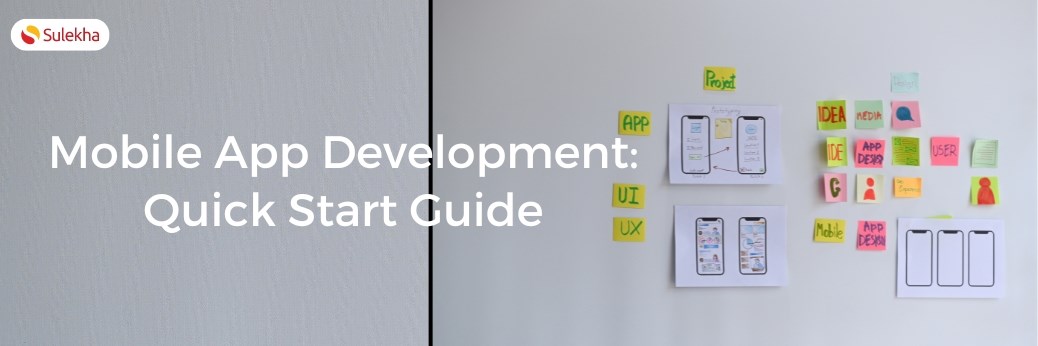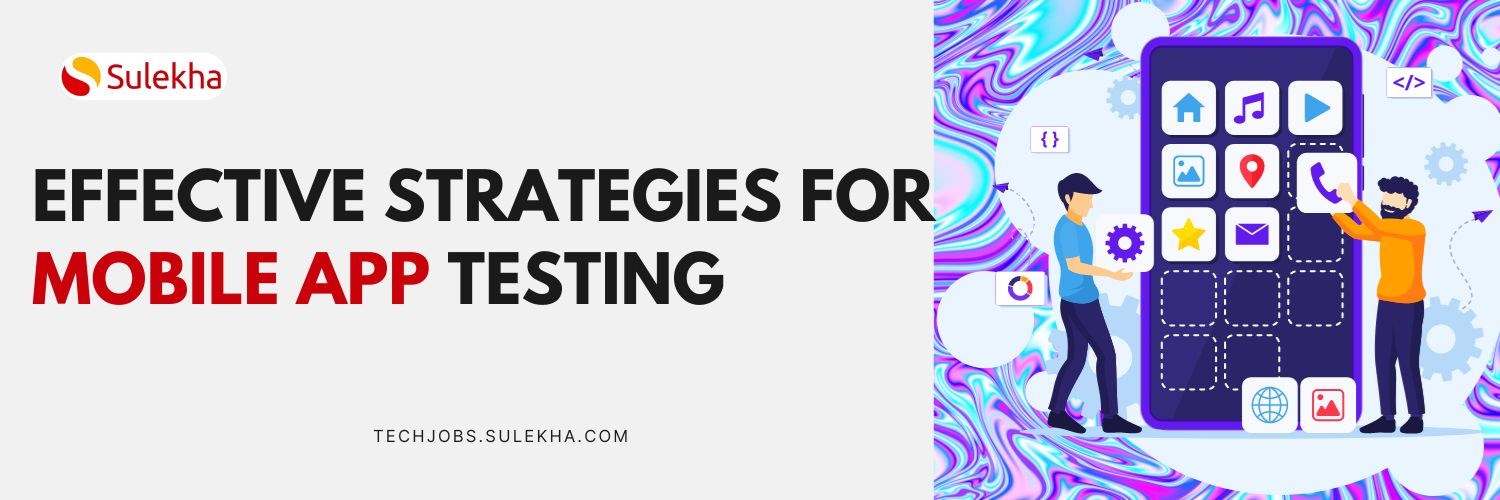Mobile App Development: Quick Start Guide

Mobile App Development: Quick Start Guide
Mobile app development is a demanding career path due to the dynamic nature of the technology landscape and the ever-evolving user expectations. As the demand for innovative and user-friendly mobile applications continues to surge, developers face the challenge of staying abreast of rapidly changing frameworks, languages, and design principles. Additionally, the diversity of mobile platforms, such as iOS and Android, necessitates proficiency in multiple programming languages and development environments. The app market's competitive nature requires developers to possess technical skills and a keen understanding of user experience, market trends, and business strategies.
Mobile apps are expected to generate over $935 billion in revenue in 2024. The Apple App Store has 1.95 million apps available for download. There are 2.86 million apps available for download on the Google Play Store. 22% of Millennial open an app 50+ times per day.
What is mobile application development?
- Mobile application development creates software applications for mobile devices such as smartphones, tablets, and other handheld devices. This field encompasses various activities, including designing, building, testing, and deploying mobile applications.
- The development of mobile applications typically involves using specialized programming languages and development frameworks to create applications that can be installed and run on mobile devices.
- These applications can leverage the unique features of mobile devices, such as touchscreens, cameras, GPS, accelerometers, and other sensors.
- Several essential aspects to consider in mobile application development include user interface design, performance optimization, security, and compatibility with mobile platforms and devices. Developers must also consider the constraints of mobile devices, such as limited processing power, memory, and battery life when creating applications.
Mobile application development can be categorized into two main approaches:
- Native
- Cross-platform development
- Native development involves creating applications for a specific mobile platform, such as iOS or Android, using platform-specific programming languages and development tools.
- Cross-platform development, on the other hand, involves creating applications that can run on multiple mobile platforms using a single codebase, often through frameworks like React Native, Xamarin, or Flutter.
The mobile app development process typically involves several stages:
- Conceptualization
- Planning
- Design
- Development
- Testing
- Deployment,
- And ongoing maintenance and updates.
It requires collaboration between developers, designers, and other stakeholders to create user-friendly, functional, and secure mobile applications that meet the needs and expectations of users.
Choose a platform
- Many application developers' teams choose to build Android applications, and it is their first attempt, too. Why did they choose Android first? Because 80 % of the smartphones around the world are Android. The Google Play Store has fewer restrictions than the Apple App Store.
- On the other hand, the application developed for iOS mandates few crucial support, and user retention is typically higher for iOS applications.
- Whatever the application, the demand is merely based on the user and target audience. For example, if you intended to design an application for your organization or employees-based applications, they must focus on the need, and it would support the platform they use.
- You might have developed cross-platform apps that can work for iOS and Android. Or, if you design apps that are used for your intended customers that are intentionally designed for iPhones, then your priority would be iOS applications.
- When developing your mobile applications, it's crucial to consider additional factors such as monetization strategies and expected user behavior. These aspects can be shaped by geographical and cultural factors, adding complexity to the development process.
- Improve operational efficiency and strengthen security by incorporating the development platform with the device management tool.
Develop for both Android and iOS: Native apps or hybrid apps?
- Suppose you must develop a mobile application for Android and iOS operating systems. What would be the most effective software development approach?
- Creating two native applications proves advantageous, as it enables the utilization of native APIs and programming languages specific to each operating system. This approach ensures robustness and is especially beneficial for enterprise-level applications, particularly those requiring substantial API interactions.
- Choosing to develop native applications one after the other, starting with Android, aligns with a common strategy often employed by independent app developers. Commencing the development of the complete application as a Minimum Viable Product (MVP) on the Android platform will likely be more successful. Following its initial release, you can convert and optimize the application for iOS.
- Debugging and rewriting the code in the native language and redesigning the front-end user interface are necessary. This is due to the significant differences in the functioning of the two operating systems, rendering cross-platform operations unfeasible.
- Why not initiate the project from the ground up? Although direct code translation into a new programming language isn't feasible, a significant portion of the back end can be replicated for cross-platform compatibility. Frameworks, libraries, and third-party extensions frequently operate uniformly in both environments, enabling you to sidestep expensive overhauls.
- An alternative is to adopt a hybrid approach, embracing a write-once-run-anywhere methodology. Hybrid apps employ a single codebase capable of operating on both platforms. These applications are usually coded using a universally recognized programming language like Java, JavaScript, HTML, or CSS.
- Hybrid mobile application development is most effective for straightforward web applications, as it lacks access to the native APIs of the operating system. It is well-suited for relatively uncomplicated mobile applications, typically consisting of three or four pages and featuring limited functionality.
Building for a mobile platform:
- Whether you choose native or hybrid mobile application development, you will encounter one of the first challenges—working with relatively limited resources on mobile devices. Your target mobile device's processing capacity and memory are significantly less than desktop computers or enterprise servers. This presents a notable challenge, mainly if you are accustomed to the seemingly boundless resources available in conventional software development for web apps. Adjusting your goals for app design becomes imperative due to the constrained resources on the mobile platform.
- During mobile application development, developers must focus on making their mobile app consume fewer resources than a typical desktop application.
- Prioritizing an excellent user experience is crucial, especially regarding mobile app interfaces. The design should be more straightforward than desktop applications, focusing on essential functions. Additionally, the interface should be optimized for touch, allowing mobile users to navigate and input information easily without excessive typing.
Examples of successful mobile apps in today's market
When it comes to successful mobile apps in today's market, success can be measured in multiple ways, like downloads, user engagement, revenue, or cultural impact. Here are some examples that excel in different areas:
Downloads and Engagement:
- TikTok: The undisputed king of downloads in 2023, TikTok boasts over 672 million installs and continues to captivate users with its short-form video format and personalized algorithm.
- Instagram: Though overshadowed by TikTok in downloads, Instagram remains a social media powerhouse, with over 547 million downloads in 2023. Its focus on visual storytelling and influencer culture keeps users engaged.
- Subway Surfers: This endless runner game consistently tops download charts across different regions, proving the enduring appeal of simple yet addictive mobile gaming experiences.
Revenue and Monetization:
- Netflix: The streaming giant's mobile app is a crucial driver of subscriber growth and engagement, offering convenient access to its vast content library anywhere.
- Spotify: With its premium subscription model and personalized playlists, Spotify has become the go-to music streaming app for millions, demonstrating the success of subscription-based mobile entertainment.
- TikTok: While still young in monetization efforts, TikTok's growing brand partnerships and in-app purchases show its potential to become a major revenue player in the mobile landscape.
Eight features of a successful mobile app
- User-Friendly Interface: A successful mobile app has an intuitive, user-friendly interface to ensure a positive user experience.
- Performance Optimization prioritizes fast loading times and smooth performance to retain user engagement.
- Cross-Platform Compatibility: It is designed to function seamlessly across various devices and operating systems for widespread accessibility.
- Security Measures: Implementing robust security features to protect user data and ensure the app's trustworthiness.
- Regular Updates: Successful apps consistently release updates to introduce new features, improve security, and fix bugs.
- Effective Monetization Strategy: Implementing a well-thought-out monetization strategy, whether through ads, in-app purchases, or subscriptions.
- Offline Functionality: Providing features that allow users to access some app functions without a constant internet connection.
- Clear Purpose and Value: A successful app clearly defines its purpose, delivers value to users, and addresses a specific need or problem.
Join a developer program
Joining a developer program is crucial for mobile app developers as it opens doors to a wealth of resources, support, and opportunities that can significantly enhance their app development journey. Developer programs, often provided by platforms like Apple, Google, or Microsoft, offer access to official software development kits (SDKs), APIs, and documentation, providing developers with the tools needed to create robust and feature-rich applications. Additionally, these programs offer valuable insights, updates on the latest industry trends, and forums for networking with fellow developers. The collaborative environment within these programs fosters continuous learning, helps in resolving challenges, and ultimately contributes to the success of mobile app developers in a rapidly evolving tech landscape.
In conclusion, embarking on a journey into mobile app development requires a strategic and well-informed approach. This quick start guide has emphasized the foundational steps, from choosing a platform and learning essential programming languages to leveraging development tools and joining relevant developer programs. The key lies in continuous learning, staying abreast of technological advancements, and embracing the collaborative spirit within the developer community.
Take the next step towards your professional goals in Mobile Apps Development
Don't hesitate to talk with our course advisor right now
Receive a call
Contact NowMake a call
+1-732-338-7323Related blogs on Mobile Apps Development to learn more

Effective Strategies for Mobile App Testing in 2024
Learn how to streamline your testing process, ensure a seamless user experience, and deliver high-quality mobile apps that meet evolving user demands.

Augmented Reality all set to blend your physical and digital world into one
Augmented Reality is a new-age technology that overlays digital information above physical environments as seen by a user through a digital device.

Must Have Skills for Career in iOS Mobile Applications
Back in the 70’s, people were fascinated by a computer that needed a truck for transportation and had only 100 MB memory space. In 40 years’ time, we have traversed so much in time that the concept of a computer has become almost redundant. Almost al

Upcoming Trends In The iOS App Market to Look Out For
The internet is dictating the world of technology and entertainment in a big way and everyday manufacturers and developers of mobile phone and its software components are struggling to make their presence felt. The task obviously is not very easy in

Look Out For New Inclusions In Mobile App Development Industry
The mobile app development industry is a multimillion dollar industry. This industry is as huge as the core IT sector and it is believed that the mobile APP development has a potential of further growth as mobile companies are now launching gears tha

Becoming an Android Developer – The Positives
Ever since smartphones emerged, there has been a tug of war between the two major operating systems for mobile devices; Apple’s iOS and Google’s Android. With smartphones now commonplace around the world, there are growing opportunities for both iOS

Have a Mobile App Idea? Validate it with These Steps
The staggering popularity of applications for mobile devices only goes to show how far technology has come. Barely a decade ago, mobile technology took its nascent steps towards mobile internet services. And now, smartphones with round-the-clock inte

Skills Required by a Mobile App Developer
In todays’ world, technology has advanced to higher levels, with mobile technology making a breakthrough in the world of inventions. Mobiles have become an integral part of the modern life style. The invention of smartphones with high end user friend

A Career in Mobile Application Development: Why You Should Pursue One
If you live in any urban part of the world, take a good look around you. One of the most common sights you would witness is a whole host of people staring deep into their smartphones. Some of them are making light conversation on instant messaging ap

The Quintessential Characteristics of a Successful Mobile App
Mobile phones have come a long way. There was a time when the most high-end mobile phone was one that allowed you to play and store MP3s and low-resolution videos alongside basic mobile functionalities, and that was it. But now, times have changed. I
Latest blogs on technology to explore

Drug Safety & Pharmacovigilance: Your 2026 Career Passport to a Booming Healthcare Industry!
Why This Course Is the Hottest Ticket for Science Grads & Healthcare Pros (No Lab Coat Required!)" The Exploding Demand for Drug Safety Experts "Did you know? The global pharmacovigilance market is set to hit $12.5B by 2026 (Grand View Research, 202

Launch Your Tech Career: Why Mastering AWS Foundation is Your Golden Ticket in 2026
There’s one skill that can open all those doors — Amazon Web Services (AWS) Foundation

Data Science in 2026: The Hottest Skill of the Decade (And How Sulekha IT Services Helps You Master It!)
Data Science: The Career that’s everywhere—and Nowhere Near Slowing Down "From Netflix recommendations to self-driving cars, data science is the secret sauce behind the tech you use every day. And here’s the kicker: The U.S. alone will have 11.5 mill

Salesforce Admin in 2026: The Career Goldmine You Didn’t Know You Needed (And How to Break In!)
The Salesforce Boom: Why Admins Are in Crazy Demand "Did you know? Salesforce is the 1 CRM platform worldwide, used by 150,000+ companies—including giants like Amazon, Coca-Cola, and Spotify (Salesforce, 2025). And here’s the kicker: Every single one

Python Power: Why 2026 Belongs to Coders Who Think in Python
If the past decade was about learning to code, the next one is about coding smarter. And in 2026, the smartest move for any IT enthusiast is learning Python — the language that powers AI models, automates the web, and drives data decisions across ind

The Tableau Revolution of 2025
"In a world drowning in data, companies aren’t just looking for analysts—they’re hunting for storytellers who can turn numbers into decisions. Enter Tableau, the #1 data visualization tool used by 86% of Fortune 500 companies (Tableau, 2024). Whether

From Student to AI Pro: What Does Prompt Engineering Entail and How Do You Start?
Explore the growing field of prompt engineering, a vital skill for AI enthusiasts. Learn how to craft optimized prompts for tools like ChatGPT and Gemini, and discover the career opportunities and skills needed to succeed in this fast-evolving indust

How Security Classification Guides Strengthen Data Protection in Modern Cybersecurity
A Security Classification Guide (SCG) defines data protection standards, ensuring sensitive information is handled securely across all levels. By outlining confidentiality, access controls, and declassification procedures, SCGs strengthen cybersecuri

Artificial Intelligence – A Growing Field of Study for Modern Learners
Artificial Intelligence is becoming a top study choice due to high job demand and future scope. This blog explains key subjects, career opportunities, and a simple AI study roadmap to help beginners start learning and build a strong career in the AI

Java in 2026: Why This ‘Old’ Language Is Still Your Golden Ticket to a Tech Career (And Where to Learn It!
Think Java is old news? Think again! 90% of Fortune 500 companies (yes, including Google, Amazon, and Netflix) run on Java (Oracle, 2025). From Android apps to banking systems, Java is the backbone of tech—and Sulekha IT Services is your fast track t